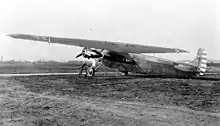Fokker F-10
The Fokker F-10 was an enlarged development of the Fokker F.VII airliner, built in the late 1920s by the Fokker Aircraft Corporation of America. A trimotor, it carried 12 passengers, four more than the F.VII, and had a larger wing and more powerful engines.
| F-10 | |
|---|---|
.jpg.webp) | |
| Fokker F-10A Super Trimotor | |
| Role | Passenger and military transport |
| National origin | United States |
| Manufacturer | Fokker Aircraft Corporation of America |
| Introduction | 1927 |
| Number built | 65 |
| Developed from | Fokker F.VII |
Operational history
Fokker built 65 for commercial and military service. After the crash of a Transcontinental & Western Air F-10 in 1931, killing Notre Dame football coach Knute Rockne and seven others, which was caused by the deterioration of the wooden wing spar, the type was temporarily grounded, and it was required to undergo more frequent and rigorous inspection. Its public image was also greatly damaged, leading to its early retirement from U.S. airlines.
Variants

.jpg.webp)
- F-10
- Initial production variant
- F-10A
- Improved and revised 14-passenger variant powered by three 420 hp (310 kW) Pratt & Whitney Wasp radial engines,[1] often called the Super Trimotor.
- C-5
- United States Army designation for the evaluation of one re-engined F-10A powered by three Wright R-975 radials.
- LB-2
- Light bomber version.
- RA-4
- United States Navy designation for the evaluation of one F-10A.
Operators
Civil operators
.jpg.webp)
- American Airways
- TWA
- Pan Am
- Universal Airlines
- Western Air Express (launch customer [2])
- Boston-Maine Airways[3]
Accidents and incidents
- On June 10, 1929, a Pan Am F-10, registration NC9700 and named Cuba, struck telephone wires and crashed while taking off from Santiago de Cuba bound for Havana, killing two of five on board. The aircraft failed to gain altitude due to a waterlogged runway.
- On March 31, 1931, a Transcontinental & Western Air F-10 crashed near Bazaar, Kansas after a wing separated in flight, killing all eight on board, including football coach Knute Rockne.
- On March 19, 1932, an American Airways F-10A, registration NC652E, struck power lines in heavy fog and crashed into an orchard near Calimesa, California, killing all seven on board.
- On September 8, 1932, an American Airways F-10, registration NC9716, crashed into a mountain in poor weather near Salt Flat, Texas, killing three of four on board.
Specifications (F-10)

Data from Jane's all the World's Aircraft 1928,[5] Aero Favourites:Fokker F.10[6]
General characteristics
- Crew: 1 pilot
- Capacity: 12 passengers
- Length: 50 ft 8 in (15.44 m)
- Wingspan: 71 ft 2 in (21.69 m)
- Height: 12 ft 5 in (3.78 m)
- Wing area: 728 sq ft (67.6 m2)
- Empty weight: 6,550 lb (2,971 kg)
- Gross weight: 11,500 lb (5,216 kg)
- Powerplant: 3 × Pratt & Whitney R-1340 Wasp 9-cylinder air-cooled radial piston engines, 425 hp (317 kW) each
- Propellers: 3-bladed metal propellers
Performance
- Maximum speed: 140 mph (230 km/h, 120 kn)
- Cruise speed: 120 mph (190 km/h, 100 kn)
- Landing speed: 55 mph (48 kn; 89 km/h)
- Range: 795 mi (1,279 km, 691 nmi)
- Service ceiling: 18,000 ft (5,500 m)
- Rate of climb: 1,420 ft/min (7.2 m/s)
- Time to altitude: 10,000 ft (3,000 m) in 10 minutes
- Wing loading: 15.8 lb/sq ft (77 kg/m2)
- Power/mass: 9.05 lb/hp (5.50 kg/kW)
See also
Related development
Aircraft of comparable role, configuration, and era
References
- AAHS Journal: 42. Spring 2004.
{{cite journal}}: Missing or empty|title=(help) - "Living History". Archived from the original on 2004-12-08. Retrieved 2008-08-25.
- "Logbook Magazine". Archived from the original on 2015-07-29. Retrieved 2015-05-12.
- "Cargo Aircraft Designations". Archived from the original on 2009-02-11. Retrieved 2008-08-25.
- Grey, C.G., ed. (1928). Jane's all the World's Aircraft 1928. London: Sampson Low, Marston & company, ltd. pp. 18d–19d.
- "Fokker F.VII". aerofavourites.nl. Archived from the original on 24 July 2011. Retrieved 22 January 2018.
External links
- "The Fokker "F-10" Monoplane: An American-built Three-engined Commercial Model". Flight. XX (50): 1048–1049. December 13, 1928. Retrieved October 17, 2012. A contemporary technical article on the Fokker F-10. (Though the article does not mention the long-winged F-10A, the table of specs at the end appear to be for this version. Specs in the rest of the article are for the original F-10.)